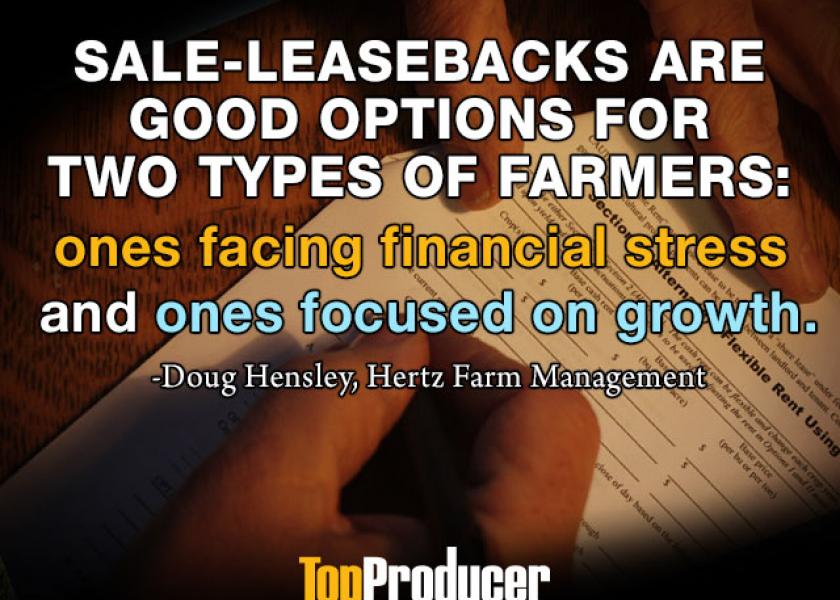The Pros and Cons of Sale-Leasebacks

In today’s challenging environment, farmland sale-leasebacks are becoming more common and potentially smart strategy for farmers. As farmers’ financial positions continue to deteriorate and investing in farmland looks favorable for non-farming investors, these arrangements can be a win-win for both parties.
“In a sale-leaseback, a farmer sells a piece of land to a non-farming investor who will lease the farm back to the farmer for an agreed time period,” says Doug Hensley, president of real estate services for Hertz Farm Management in Nevada, Iowa. “In some cases, the farmer can also negotiate to have the first right to re-purchase if the investor should move to sell the land in the future.”
Hensley says sale-leasebacks are good for two types of farmers:
- Those facing financial stress.
- Those focused on growth.
“As farmers were renewing operating lines late this winter/early spring, there were some situations where bankers said, ‘You need to sell a piece of equipment or a non-vital 40- or 80-acre tract, in order to free up some cash flow and improve your working capital position,’” Hensley says. “A sale-leaseback can improve the financial position for someone who is carrying too much short-term debt, while still allowing them to maintain operational control of the underlying asset.”
While there is risk in relinquishing control of an important asset, it can be better than the alternative of losing the land altogether.
Flipping Farms
For growth-minded farmers, sale-leasebacks can be similar to the “flipping houses” strategy in real estate.
For growth-minded farmers, sale-leasebacks can be similar to flipping houses. “Farmers can expand the acres they are farming without having to go borrow the money and take on extra debt,” explains John Kirkpatrick, executive vice president for Murray Wise Associates in Clarion, Iowa.
“I’ve also worked with some farm operators who have used sale-leaseback as a growth strategy over time,” adds Hensley. “They may see a farm that needs a little love, and they feel like they have the equipment, manpower and ability to improve that farm. They’ll buy it and improve it over three to five years and then put it back on the market to capture some gain, while maintaining the lease.”
The farmer can then use the profits from selling the land to buy another property and start the process over.
“For most farmers, controlling land via a farm lease can be more profitable than owning the land,” Hensley says. “Additionally, there are many investors still in the market looking at farmland as a diversification play, and they desire a long-term lease relationship.”
Typically, the farmer-seller may find themselves slightly more negotiable on the sale price, in order to attract the investor who will lease the farm back to them at a fair market rental rate. The lease parameters moving forward are negotiated right along with sale/purchase of property, and all the documents are completed at closing. Years ago, Hensley says, leases would last multiple years or even decades. But the typical agreement today is set for one to three years, often with a chance to renew.
Most lease-back sales are done quietly, Kirkpatrick says. He encourages farmers and investors to contact farmland management companies, real estate brokers and lenders. Those professionals can often pair farmers and investors.
Also, if you’re interested in these arrangements, be sure to include your trusted advisors in the process. Lawyers, CPAs and lenders can provide valuable guidance on if this is the right strategy for your farm.
The Nitty Gritty of a Sale-Leaseback
In a sale-leaseback, a farmer sells a piece of land to a non-farming investor who will lease the farm back to the farmer for an agreed-upon time. Farmers can negotiate to have the first right to repurchase the land in the future. Typically, the farmer-seller will lower the price a bit, to attract the right investor, says Doug Hensley, Hertz Farm Management.
The lease parameters are negotiated along with the sale/purchase of the property, and all the documents are completed at closing. In the past, leases would last years or even decades. But the typical agreement today is one to three years, often with a chance to renew.
Read More
Does It Pay to Farm Every Acre you Own?
Strategies To Nail Your Cash Rent Negotiations
Three Tips To Lower Farmland Cash Rent
Learn more about Hertz Farm Management.







